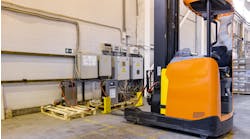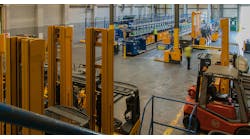We Will Win!
The attack on Pearl Harbor. The Kennedy/King assassinations. The Challenger explosion.
Anyone alive when these things happened remembers exactly where he was when he found out about them. These events changed the U.S., for better and for worse. For worse because we lost a little of our innocence each time. For the better because we grew stronger and smarter.
On September 11, 2001, I was in a conference room in France. I and several other editors were learning about new variable speed drives and electronic power products as part of a press tour of Schneider Electric customer sites. In the middle of our meeting, our host’s secretary came in with a news bulletin about the U.S. It was in French, so he had to translate for us.
Four jets hijacked? Two crashed into the towers of the World Trade Center? One hit the Pentagon? One still missing? Thousands feared dead? His translation had to be faulty. He was misinterpreting. It had to be a hoax.
Denial was our only protection from the truth. But that shield soon fell. We slowly realized we’d just been born into a new day of infamy. This was not just an attack on American soil. We editors were 3,000 miles from home, but the explosion of those buildings was felt by everyone in that room — French and American. This was an attack of global proportions. On the free flow of goods through international supply chains.
In the days following, every company we visited in France voiced sympathy for and solidarity with their American guests. We editors soon realized this trip was not only a learning opportunity for us, but a chance to re-enforce something we all should know about our readers. You are the decision-makers who give life to global commerce. That life was threatened on September 11.
But on Monday, September 17, Wall Street came back to life. New Yorkers started repairing their connections to the global supply and demand chain. Material handlers operating front end loaders, hoists, cranes and lift trucks chipped away at thousands of tons of debris, gradually making way for a rebirth.
The terrorists thought they were attacking Manhattan, the center of U.S. commerce. But this was the World Trade Center. They’ve unwittingly become the catalyst for the growth of alliances on a global scale, both business and political. I saw the stirrings of this spirit in France. It will continue.
Will this stop terrorism? No. But let’s not be frightened of those who would destroy the free world. Let’s study them. We already know they’ve studied technology. Their knowledge of technology’s capabilities runs deep, but it’s also narrow.
They could steer the jets that destroyed an important piece of Manhattan skyline, but they didn’t know how to take off or land them.
They could tie into the databases of airlines to determine the most suitable flights for their evil purpose, but they couldn’t understand the good they could do their people by harnessing the power of international data exchange.
They chose to be part of a mindless horde marching to the orders of a zealot rather than channeling their passions in response to the demands of their individual talents. These abuses of God’s gifts will be their downfall.
Material handling logistics will clean up the wreckage in Manhattan. It will show the world that science, ingenuity and the will to be free are an indomitable combination. And it will help engineer the defeat of those who would turn technology against their fellow man.
Tom Andel
chief editor


